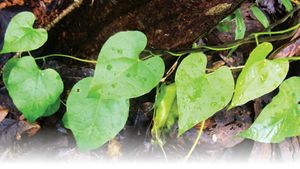Note: This is a project under development. The articles on this wiki are just being initiated and broadly incomplete. You can Help creating new pages.
Difference between revisions of "Tinospora cordifolia - Amrutha balli"
(→Chemical Composition) |
(→Common names) |
||
| Line 14: | Line 14: | ||
==Common names== | ==Common names== | ||
| − | {{Common names|kn= | + | {{Common names|kn=Amrutha balli|ml=Amruthu, Chittamruthu|sa=Guduchi, amrita, cinnodbhava|ta=Shindilakodi|te=Tippa-teega|hi=geloy|en=Tinospora cordifolia} |
==Habit== | ==Habit== | ||
Revision as of 18:00, 4 April 2018
Tinospora cordifolia which is known by the common names heart-leaved moonseed, guduchi and giloy is an herbaceous vine of the family Menispermaceae indigenous to the tropical areas of India, Myanmar and Sri Lanka.
Contents
Uses
Osteoarthritis, Pimples, Piles, Skin diseases, Diabetes, Blood pressure, Heart Diseases, Fever, Jaundice.
Parts Used
Chemical Composition
Columbin, tinosporaside, jatrorhizine, palmatine, berberine, tembeterine, tinocordifolioside, phenylpropene disaccharides, choline, tinosporic acid, tinosporal, and tinosporon have been isolated from Tinospora cordifolia.
Common names
{{Common names|kn=Amrutha balli|ml=Amruthu, Chittamruthu|sa=Guduchi, amrita, cinnodbhava|ta=Shindilakodi|te=Tippa-teega|hi=geloy|en=Tinospora cordifolia}
Habit
Identification
Leaf
| Kind | Shape | Feature |
|---|---|---|
| Simple | lanceolate | alternate, spiral, clustered at twigs end, tawny hirsute, caducous, leaving annular scar |
.[1]
Flower
| Type | Size | Color and composition | Stamen | More information |
|---|---|---|---|---|
| Unisexual | 14cm long | Pendulous, Ovoid | male flowers in axillary spikes, pendulous; female flowers in axillary spikes, ovoid |
Fruit
| Type | Size | Mass | Appearance | Seeds | More information |
|---|---|---|---|---|---|
| Syncarp (sorosis), subglobose or ellipsoid with long echinate processes, orange when ripe | seeds many, ovoid. | {{{6}}} |
Other features
List of Ayurvedic medicine in which the herb is used
- Vishatinduka Taila as root juice extract
Where to get the saplings
Mode of Propagation
How to plant/cultivate
In terms of taking care of the plant, minimal pruning is required Cutting off dead branches from the interior of the tree is only sometimes needed. In addition, twigs bearing fruit must be twisted or cut down to the trunk to induce growth for the next season. Branches should be pruned every three to four years to maintain its productivity. Stingless bees such as Tetragonula iridipennis are jackfruit pollinators, and as such, play an important role in jackfruit cultivation.
Commonly seen growing in areas
Photo Gallery
References
Cite error: <ref> tag with name "chemical composition" defined in <references> is not used in prior text.
External Links
- Artocarpus hirsutus on ENVIS Centre on Conservation of Medicinal Plants
- Artocarpus hirsutus on India Biodiversity Portal
- Artocarpus: A review of its traditional uses, phytochemistry and pharmacology
- Artocarpus: A review of its phytochemistry and pharmacology
- Pharmacognostical studies on the bark of Artocarpus hirsutus Lam
- Pages with reference errors
- Ayurvedic Herbs known to be helpful to treat Osteoarthritis
- Ayurvedic Herbs known to be helpful to treat Pimples
- Ayurvedic Herbs known to be helpful to treat Piles
- Ayurvedic Herbs known to be helpful to treat Skin diseases
- Ayurvedic Herbs known to be helpful to treat Diabetes
- Ayurvedic Herbs known to be helpful to treat Blood pressure
- Ayurvedic Herbs known to be helpful to treat Heart Diseases
- Ayurvedic Herbs known to be helpful to treat Fever
- Ayurvedic Herbs known to be helpful to treat Jaundice
- Herbs with Stem used in medicine
- Herbs with Roots used in medicine
- Herbs with Leaves used in medicine
- Habit - Tree
- Index of Plants which can be propagated by Seeds
- Index of Plants which can be propagated by Cuttings
- Index of Plants which can be propagated by Airlayers
- Herbs that are commonly seen in the region of Western Ghats
- Herbs that are commonly seen in the region of Malabar Coast
- Herbs









